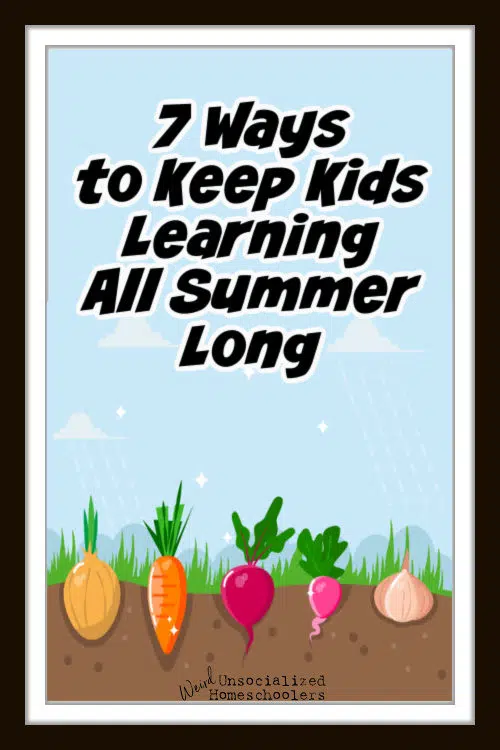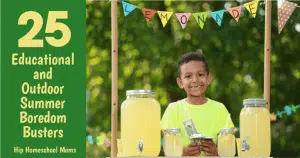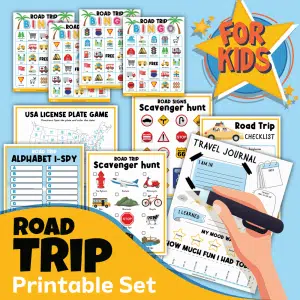7 Ways to Keep Kids Learning All Summer Long
Hip hip hooray! Summer is on its way! It’s easy to throw our hands in the air and say we’re done with school until the fall. But is that the right move? What about summer slide?
If you aren’t familiar with the term, it simply means that kids have a tendency to lose academic skills over the course of a long break. That’s why it’s important to exercise both bodies and brains during the summer months.
Summer is meant for having fun, but that doesn’t mean the learning has to stop. Learning and fun go hand in hand.
If you spend a little time planning out your days, you can sprinkle educational activities in and your kids won’t even realize it. No textbooks necessary.
Are you wondering how? Keep reading for 7 ways to keep kids learning all summer long.
7 Ways to Keep Kids Learning All Summer Long
1. Plan some fun family activities.
What kinds of family activities? I’m glad you asked!
-
Plant a garden and work in it together.
You could start by making your own garden soil mixture. While you’re at it, learn about composting and talk about what makes good soil. Why is good soil important? What happens if your soil isn’t good? Is there anything you can do to improve it?
Or you might want to use your garden as an outdoor classroom! You can learn all kinds of things from gardening together even if it doesn’t seem like you’re learning. As you decide which plants to include in your available space, take some time to talk about companion planting as a way to control garden pests, too.
-
Or Plant a flower garden instead.
You can choose which flowers to plant based on the colors you enjoy, the sizes/heights of the plants (for example, taller plants in back–shorter in front), the ability of the flowers to survive and thrive in your area of the country based on your typical weather, etc.
You might want to do something special like plant a butterfly garden! Or perhaps grow flowers you can eat. An article on Kids Gardening shares information about edible plants, but it also includes fun facts kids will enjoy.
-
Take some family field trips.
You don’t have to call your family outings field trips if you want your kids learning on the sly. Call them adventures instead. Either way, summer is the perfect time to explore your city or state and maybe even surrounding states.
Check out animal sanctuaries, botanical gardens, factories, museums, and more. The warm months are an opportune time to experience your local parks and outdoor spaces as well. Think outside the box and go see places you might not have considered during the school year.
If for some reason you aren’t able to get away from home as much as you’d like, there are lots of fantastic virtual field trips you can take too!
2. Take a taste test tour of your city.
Now that you don’t have math and language arts on the books (or even if you homeschool year-round and have a lighter schedule over the summer), take that extra time to go on a citywide culinary adventure.
-
Eat at local restaurants and have your kids write reviews.
Make a list of area restaurants you and your family would like to try. (Be sure to support small family-owned restaurants!) Then, spend your summer taste-testing your way through town, one eatery at a time.
If you want to take it up a notch, set up a website and let your kids take photos and write reviews for each restaurant you visit. Who knows? Your blog may end up with quite the following by the time you’re through! And if not, at least your kids will have gotten lots of writing experience!
-
Or just have appetizers and desserts.
Can’t afford to eat out all summer with the family? Just order appetizers or desserts! You don’t have to miss out on the fun just because you can’t buy an entire meal for each person in your family!
Or you may be able to buy a meal and have two or three people share it. Most restaurants serve meals that are much larger than what you would typically eat at home.
-
Don’t want to eat out? Cook (and eat) your way around the world or around the USA!
There are lots of cookbooks that will make it easy to cook and eat your way around the world or around the USA. If your studies the past school year (or the coming school year) have to do with a certain country, look up recipes from that country and try some! Eat Your Way Around the World is a fantastic cookbook to use! I also like Cooking Class Global Feast.
If your studies are centered more around the United States, look up recipes from different areas of the country and try some. You may even be able to visit some of the places in real life. A good cookbook for this is Eat Your Way Through the USA.
3. Give geocaching a go.
Geocaching is growing in popularity, and for good reason! It’s fun, low-cost, and it gets families outside and spending quality time together. All you need to get started is a geocaching app on your smartphone — and a few trinkets to trade once you find your first cache.
If you aren’t familiar with geocaching, it’s essentially a real-life treasure hunt. People place caches (small waterproof containers filled with goodies) in a hidden, but publically-accessible spot. Then, geocachers use the GPS on their phones to locate the cache. Once you find the cache, you sign the logbook and, if you want, you can trade your trinket for one inside the container your found.
For more information on getting started, check out the geocaching website here.
4. Try out one of the many new subscription boxes on the market.
Subscription boxes are all the rage right now. They’re popping up everywhere, and they’re a staple in many a busy homeschool mom’s bag o’ magic tricks. Subscription boxes change things up when kids are bored and need a little variation in the routine. Summertime is no different. In fact, summer is the perfect time to see what’s on the market. There is a subscription box for every age and interest. Give ‘em a go and let us know what you think!
5. Keep up with current events.
The world is a scary place. We aren’t debating that. But, it’s important to talk to your kids about what’s happening in the news. If they don’t hear it from you, they’ll hear it someplace else. Pick a kid-friendly news source and help your kids stay plugged in. Keep the door open to conversations about hard things. You want your kids to know they can come to you with their questions and concerns.
6. Learn how to do something new or take time to create a new habit.
-
Develop a new hobby.
YouTube is a nifty resource for learning just about anything. Even better? There’s no better time than summer, when schedules are wide open, to pick up a new hobby.
If you’re looking for a place to start, check out Art For Kids Hub. This channel is run by a dad and his adorable kids. They offer top-notch tutorials for drawing, painting, and even origami.
Carve out some art time each week and let your kids try a new project. It’s a way to beat the summer heat and give your kids a creative outlet. And who knows? You may find you have a budding artist in your midst.
-
Create a new habit.
Or take some time to work on creating new habits with some fun 30-day challenges! You can choose from all kinds of things to learn and do and practice and keep track of your new skills and talents using a 30-day printable habit tracker. (It’s always more fun when you can see your progress on a chart!)
7. Help your kids find a pen pal.
Writing letters to family and friends is a wonderful way to encourage your kids to practice writing over the summer. You can find pen pals through homeschool groups, online pen pal services, or by simply connecting with loved ones who live out of town.
Another option is to have your kids make cards for the elderly in nursing homes. Many of the residents in long-term care facilities don’t have friends or family and really appreciate the companionship. No matter what route you choose, you won’t go wrong teaching your kids the value of a handwritten letter.
The Wrap-Up
- Learning doesn’t have to be boring. And it doesn’t have to look like school. Take the ideas above and use them as jumping-off points to create a list of your own.
- A little planning on the front end can keep your kids learning all summer long.
- Have fun with your kiddos and enjoy your summer!
You May Also Like:
5 Fun Ways to Help Your Struggling Reader This Summer
25 Educational and Outdoor Summer Boredom Busters
Printable Road Trip Activities for Kids
Amy Thetford is a freelance writer and blogger who homeschools her tribe of tiny humans while pursuing her lifelong dream of becoming a published author. She is fueled by coffee and the desire to do ALL. THE. THINGS. She has the attention span of a squirrel, though she somehow manages to make it through each day with everyone fed and happy (well, mostly happy! Ha!) while striving to make every tomorrow better than the last.








